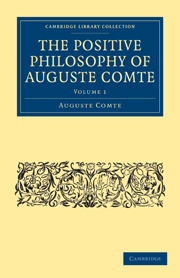CHAPTER II - VIEW OF THE HIERARCHY OF THE POSITIVE SCIENCES
Published online by Cambridge University Press: 29 August 2010
Summary
Failure of proposed classifications
In proceeding to offer a Classification of the Sciences, we must leave on one side all others that have as yet been attempted. Such scales as those of Bacon and D'Alembert are constructed upon an arbitrary division of the faculties of the mind; whereas, our principal faculties are often engaged at the same time in any scientific pursuit. As for other classifications, they have failed, through one fault or another, to command assent: so that there are almost as many schemes as there are individuals to propose them. The failure has been so conspicuous, that the best minds feel a prejudice against this kind of enterprise, in any shape.
Now, what is the reason of this?—For one reason, the distribution of the sciences, having become a somewhat discredited task, has of late been undertaken chiefly by persons who have no sound knowledge of any science at all. A more important and less personal reason, however, is, the want of homogeneousness in the different parts of the intellectual system,—some having successively become positive, while others remain theological or metaphysical. Among such incoherent materials, classification is of course impossible. Every attempt at a distribution has failed from this cause, without the distributor being able to see why;—without his discovering that a radical contrariety existed between the materials he was endeavouring to combine.
- Type
- Chapter
- Information
- The Positive Philosophy of Auguste Comte , pp. 18 - 33Publisher: Cambridge University PressPrint publication year: 2009First published in: 1853



